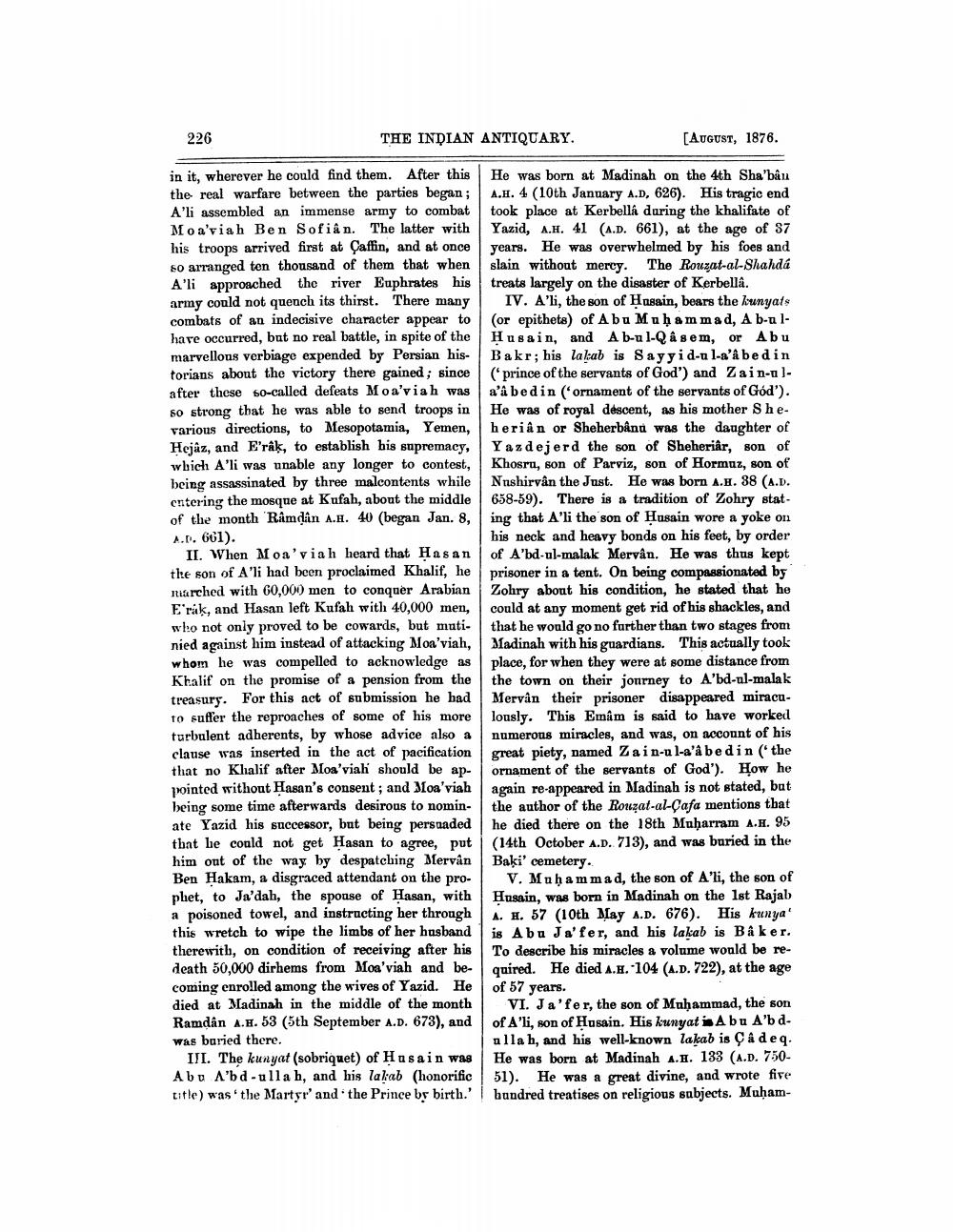________________
226
THE INDIAN ANTIQUARY.
[AUGUST, 1876.
in it, wherever he could find them. After this the real warfare between the parties began; A'li assembled an immense army to combat M o a'viah Ben Sofia n. The latter with his troops arrived first at Çaffin, and at once 80 arranged ten thousand of them that when A'li approached the river Euphrates his army could not quench its thirst. There many combats of an indecisive character appear to have occurred, but no real battle, in spite of the marvellons verbiage expended by Persian his- torians about the victory there gained ; since after these so-called defeats Moa'viah was so strong that he was able to send troops in various directions, to Mesopotamia, Yemen, Hejáz, and Erak, to establish his supremacy, which A'li was unable any longer to contest, being assassinated by three malcontents while entering the mosque at Kufah, about the middle of the month Råmdan A.H. 40 (began Jan. 8, A.D. 661).
II. When Moa'via h heard that Hasan the son of A'li had been proclaimed Khalif, he narched with 60,000 men to conquer Arabian E'rak, and Hasan left Kufah with 40,000 men, who not only proved to be cowards, but muti. nied against him instead of attacking Moa'viah, whom he was compelled to acknowledge as Khalif on the promise of a pension from the treasury. For this act of submission he had to suffer the reproaches of some of his more turbulent adherents, by whose advice also a clause was inserted in the act of pacification that no Khalif after Moa'viah should be appointed without Hasan's consent; and Moa'viah being some time afterwards desirous to nominate Yazid his successor, but being persuaded that he could not get Hasan to agree, put him out of the way by despatching Mervan Ben Hakam, a disgraced attendant on the prophet, to Ja'dah, the spouse of Hasan, with a poisoned towel, and instructing her through this wretch to wipe the limbs of her husband therewith, on condition of receiving after his death 50,000 dirhems from Moa'viah and becoming enrolled among the wives of Yazid. He died at Madinah in the middle of the month Ramdan A... 53 (5th September A.D. 673), and was buried there.
III. The kunyat (sobriquet) of Husain was Abo A'bd-ullah, and his lakab (honorific title) was the Martyr' and the Prince br birth.'
He was born at Madinah on the 4th Sha'bân A.H. 4 (10th January A.D, 626). His tragic end took place at Kerbellá during the khalifate of Yazid, A.H. 41 (A.D. 661), at the age of 37 years. He was overwhelmed by his foes and slain without mercy. The Rouzat-al-Shahda treats largely on the disaster of Kerbella.
IV. A'li, the son of Hasain, bears the kunyats (or epithets) of Abu Muḥammad, A b-alHusain, and Ab-ul-Qasem, or Abu Bakr; his lakab is Sayyid-a l-a'â bedin (prince of the servants of God') and Zain-ula'á bedin ornament of the servants of God'). He was of royal descent, as his mother Sheheriâ n or Sheherbând was the daughter of Yazdejerd the son of Sheheriâr, son of Khosro, son of Parviz, son of Hormuz, son of Nushirvân the Just. He was born A... 88 (A.D. 658-59). There is a tradition of Zohry stating that A'li the son of Husain wore a yoke on his neck and heavy bonds on his feet, by order of A'bd-ul-malak Mervån. He was thus kept prisoner in a tent. On being compassionated by Zohry about his condition, he stated that he could at any moment get rid of his shackles, and that he would go no further than two stages from Madinah with his guardians. This actually took place, for when they were at some distance from the town on their journey to A'bd-ul-malak Mervân their prisoner disappeared miraculously. This Emam is said to have worked numerous miracles, and was, on account of his great piety, named Zain-u l-a'à bedin (* the ornament of the servants of God'). How he again re-appeared in Madinah is not stated, but the author of the Rougat-al-Çafa mentions that he died there on the 18th Muharram A.H. 95 (14th October A.D. 713), and was buried in the Baki' cemetery.
V. Muhammad, the son of A'li, the son of Husain, was born in Madinah on the 1st Rajab A. H. 57 (10th May A.D. 676). His kunya' is Abu Ja'fer, and his lakab is Baker. To describe his miracles a volume would be required. He died A.. 104 (A.D. 722), at the age of 57 years.
VI. Ja'fer, the son of Muhammad, the son of A'li, son of Husain. His kunyat is Abu A'bdullah, and his well-known lakab is Çadeq. He was born at Madinah A.1. 133 (A.D. 75051). He was a great divine, and wrote fire bundred treatises on religious subjects. Muham




